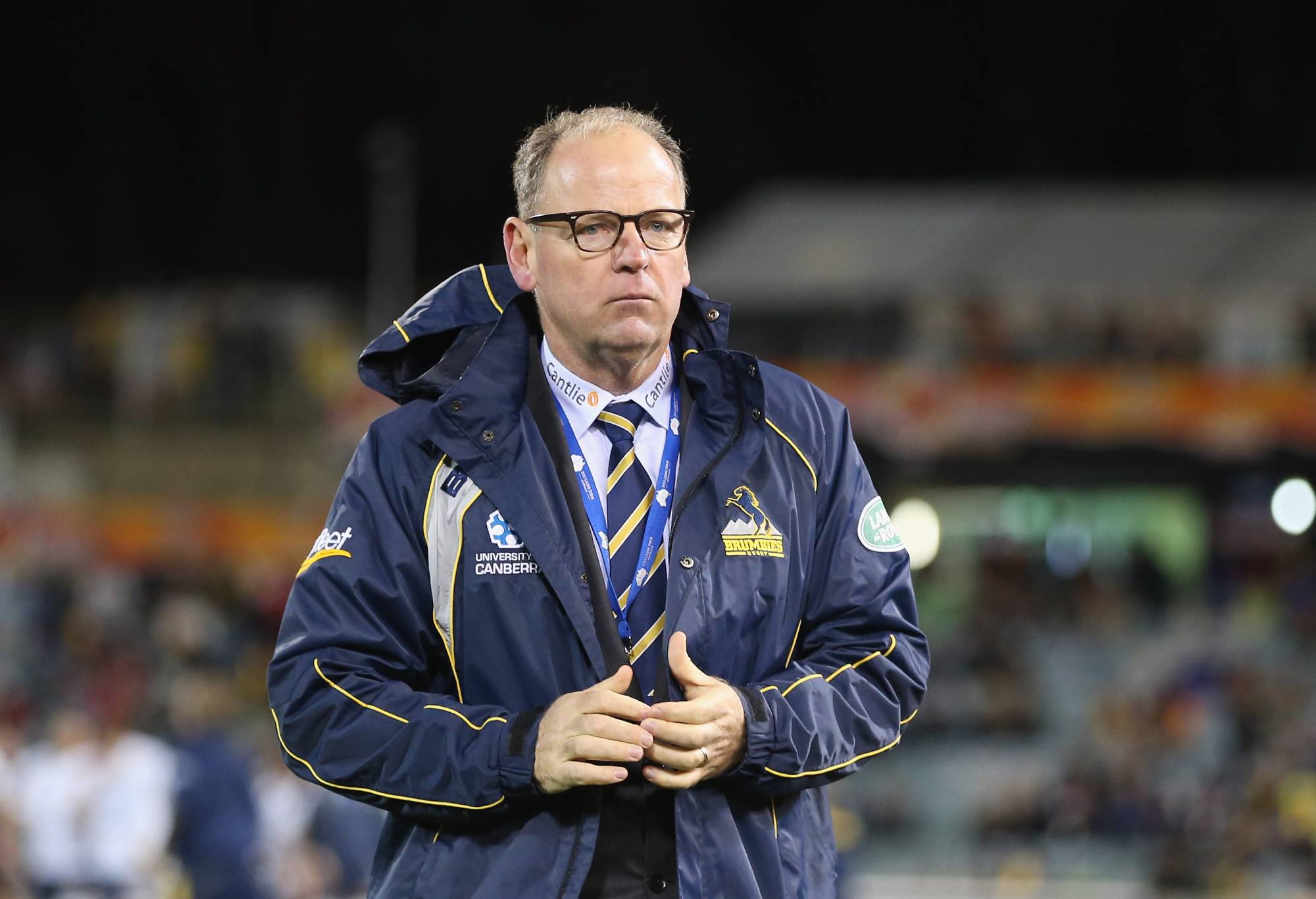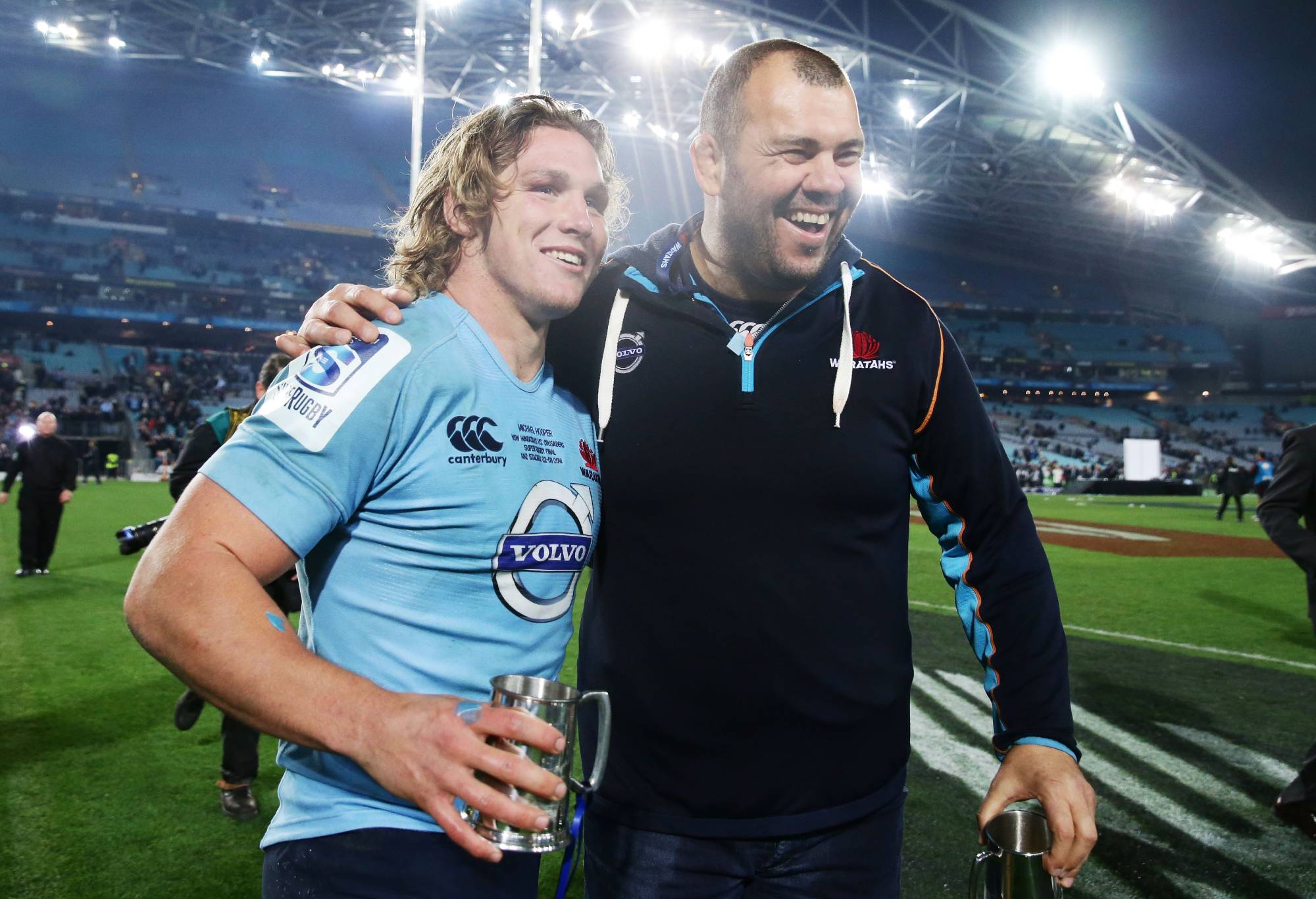It was almost a decade ago that Jake White was walking in the Manly promenade when he heard something rapidly approaching behind him.
“I thought, what is this noise?” White told The Roar.
“I turned around and there was a man with long hair and a baseball cap turned around the wrong way on a skateboard coming towards me. And I just thought, ‘Shit, it’s Michael.’ He had already been made captain of Australia by then.”
A couple of years earlier and it wasn’t just the scene that was different, so too was the mood.
Openside flankers are always looking for a window. For Hooper, one opened in early 2012.

Michael Hooper of the Waratahs celebrates with teammats after defeating the Crusaders at ANZ Stadium to win the Super Rugby title on August 2, 2014 in Sydney. (Photo by Mark Nolan/Getty Images)
Sensing his window at the Brumbies might be closing, Hooper kept an ear out for any opportunities that might be popping up at his childhood club following Phil Waugh’s retirement.
One did, and for White, who had come to Canberra with a big reputation after his deeds with South Africa, he was too slow to react or, at least, adjust his thinking.
Having monstered his way to World Cup glory with one of the biggest packs in Cup history, White initially stuck with his tried and tested ways by employing the monstrous Ita Vaea in the coveted No.7 jersey.
Concerned he might be squeezed out, Hooper quietly pounced on an opening back up the Hume Highway despite quickly winning over his new boss at the Brumbies.
“I was trying to sign and extend guys and build my team and Colby [Fainga’a] had extended, Matt To’omua had extended, Tevita [Kuridrani] had a long-term deal, but Michael didn’t extend,” White said.
“I then got wind that he had already signed at the Tahs, so he was basically going to finish his deal with us and then he was going to move across to the Waratahs because his family lived there.
“I think he thought that if I ever found out, I wouldn’t have played him and played Colby instead.
“But once we started to play and train it was obvious Michael was very quick and was basically complementing what we had. We had [Peter] Kimlin, Scotty Fardy, Fotu [Auelea] and his skill set was really different, so I kept playing him.
“I think he was thankful that he didn’t get left out because I think he thought I was going to leave him out, but I already knew he was going. It was counter-productive for me because I was basically coaching and upskilling a guy that was going to play against us, and not just play against us for one year but 10 years and captaining Australia.”

Jake White coached Michael Hooper in 2012. (Photo by David Rogers/Getty Images)
One man to benefit from Hooper’s Brumbies departure was Michael Cheika, who had just taken over from Michael Foley as Waratahs coach.
Very quickly, the former Randwick back-rower turned coach liked what he saw.
“I suppose the first impressions about Michael would have just been about him being very ambitious, really wanting to succeed, very clear in what he wanted to do, what he needed to do and very open to new ideas as well,” Cheika told The Roar.
“He was a guy that you could new things with and do different things. He was always open to seeing how he could be better.
“You knew you could count on him from day one. I think that’s how I genuinely felt, he was someone that you could definitely count on.”
It was those leadership qualities that led to Cheika asking Hooper to spearhead their 2014 finals charge after Dave Dennis suffered a season-ending injury.
“It was a straightforward decision for me,” Cheika said.
“You could see the hallmarks of him coming through over the time there as a leader, through the way he was able to behave with his teammates and the respect he had with his teammates.
“That’s one of the skills that’s getting lost more and more is your teammates being able to tell you some hard truths and not crying about it. Take it on the chin and taking it as constructive thing, like, I’ll get better at that. Hoops had the ability to do that because of who he was and the relationships he built with players.
“It was tricky there because there were other guys in those same positions that were probably more senior positions; Pat McCutcheon was there, guys who were older and maybe had more runs on the board, but when you’re turning these things around, like we were, the future is where you need to push.
“To get older players to perform better younger players need to put pressure on them, and Hoops was really integral in being able to put pressure on and demand standards. He led a group of guys younger guys that lifted the standards of everyone.
“That’s why he’s special because he’s very comfortable in taking all types of feedback, with the intention of him getting better as a player, because he was the person who wanted to get himself better more than anyone. He’s very self-driven, you didn’t need to wind him up to much.”

Michael Hooper (L) celebrates with coach Michael Cheika after the Waratahs won the 2014 Super Rugby title. (Photo by Matt King/Getty Images)
It’s those characteristics Cheika speaks of that led Hooper claiming the Matt Burke Cup in seven of the nine seasons he’s played at the Waratahs. An eighth, to go along with four John Eales Medals, could come later this season.
Before then though, Hooper will pull on the blue jersey one last time in Sydney as the Waratahs host Moana Pasifika on Saturday ahead of next weekend’s quarter-final against the Blues at Eden Park.
In typical Hooper fashion though, the 31-year-old didn’t want to talk about his enduring legacy when speaking with the media on Tuesday.
Cheika, however, was happy to do so, describing his long-time captain as “the driving force behind the title” in 2014.
“How they rallied around him in those years sets the standard for the club to go back to,” Cheika said.
“I think his talismanic approach to the game is something that, managed correctly, all players in the Waratahs should be striving to be like him.”
White, meanwhile, said he was proud of Hooper.
“When you have surpassed a guy like George Smith, who was considered the best in the world, and you’ve broken his record as the most capped openside in Australia, you can’t fluke that. You can’t make that up,” he said.
“You’ve got to give him all the accolades.
“And for a ‘little guy’, and I say that in inverted commas, the resilience and the amount of injuries that he’s managed to avoid is phenomenal.
“I mean, he’s fronted up as captain of his club and captain of his country and he’s just gone and gone and gone and gone. It’s been incredible to watch.”
As for whether White wished he’d been able to keep Hooper a Brumby, he doesn’t need a second to think.
“Yeah, we always wanted to keep him. I mean, let’s be honest. Who wouldn’t have?”































































































